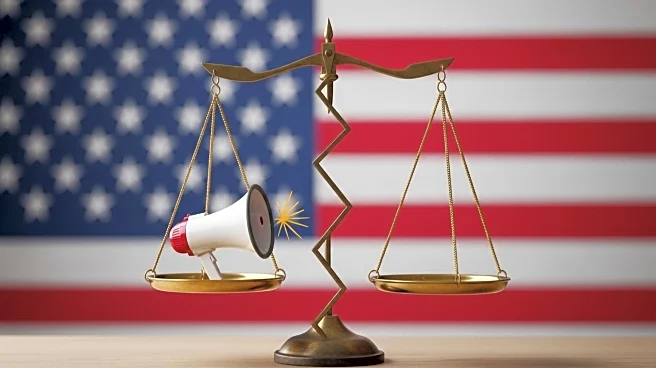What's Happening?
The United States is experiencing increased political polarization, which is leading to a phenomenon known as the 'spiral of silence.' This term, coined by German political scientist Elisabeth Noelle-Neumann, describes how individuals refrain from expressing their opinions due to fear of social sanctions. Recent studies indicate that Americans are less likely to voice their opinions publicly, even more so than during the McCarthy-era Red Scare. This self-censorship is exacerbated by aggressive minorities imposing costs on those who express controversial views, leading to a divergence between true public opinion and expressed public opinion. The result is a stifling of free-ranging debate, essential for democratic politics.
Why It's Important?
The rise in self-censorship and political polarization has significant implications for democratic deliberation in the U.S. It undermines the processes of discussion, negotiation, and compromise necessary for effective public policy-making. As individuals become less willing to express their views, the marketplace of ideas becomes skewed, limiting the diversity of opinions and stifling robust debate. This environment allows extreme ideas to flourish unchecked, while good ideas lose the opportunity to be refined through competition. The spiral of silence thus poses a threat to pluralistic debate and democracy itself, as it prevents the healthy exchange of ideas and the strengthening of democratic institutions.
What's Next?
If the current trend of self-censorship continues, it could lead to further entrenchment of political polarization and a weakening of democratic processes. Stakeholders such as political leaders, civil society groups, and educational institutions may need to address the underlying causes of affective polarization and promote environments where diverse opinions can be expressed without fear of retribution. Efforts to encourage open dialogue and tolerance for differing viewpoints could help mitigate the spiral of silence and restore the integrity of democratic debate.
Beyond the Headlines
The implications of the spiral of silence extend beyond immediate political discourse. It raises ethical concerns about freedom of speech and the role of social media in amplifying aggressive minority views. Additionally, it highlights the cultural shift towards intolerance and the potential long-term impact on civic engagement and social cohesion. Addressing these issues may require a reevaluation of societal values and the promotion of inclusivity and respect for diverse perspectives.










